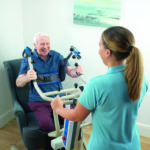Frequently Used Medical Terms You May Need To Know

If your spinal cord injury is relatively new, you may still be learning the meaning of unfamiliar medical terms that you’ve never heard before.
To give you a head start on learning some of these words, here is a list of terms that are frequently used.
Doctors and Therapists
Neurosurgeon
a specialist who does surgery on the brain and spinal cord
Neurologist
a specialist who diagnoses and treats diseases and disorders of the neurological system
Urologist
a specialist who diagnoses, treats and does surgery on the urological system as well as the male reproductive system
Gastroenterologist
a specialist who manages diseases and disorders of the gastrointestinal tract, including the stomach and intestines
Vocational therapist
assists people with disabilities by assessing job skills, helping them return to work, and helping them maintain their position
Rehabilitation nurse
nurse trained in rehabilitative and restorative medicine
Recreational therapist
a therapist who uses recreation and activity-based interventions in a systematic process to address goals that improve the well-being of a patient
Physiotherapist
therapist who addresses motor impairment by working with the joints, muscles, and nerves
Physiatrist
a doctor who specializes in restoring or improving the functional ability of those with physical disabilities
Occupational Therapist
assist in helping the patient learn how to perform activities of daily living and addresses fine motor issues, such as handwriting
Tests And Procedures
- Sensory Index Score (SIS) – this uses light touch and pinprick in 28 points on both sides of the patient’s body to find out what the patient can feel
- Myelography – an X-ray that involves the injection of dye into the spine to help the doctor see the patient’s nerve roots more clearly
- Magnetic Resonance Imaging (MRI) – images created by a magnetic field and radio waves that produce detailed pictures of tissues and organs
- Motor Index Score (MIS) – a scoring system used to determine muscle strength of ten different muscles on each side of the body, on a scale of 0 to 5
- Computerized Tomography Scan (CT scan) – a scan that makes detailed pictures of parts of the body by taking x-rays of cross-sections of the area and then putting them all together on a computer
- ASIA/ISCoS Exam and Grading System – a standardized system of tests that are given within the first 72 hours after an injury to determine patient’s future recovery and rehabilitation needs
Medical Terminology
Tetraplegia
paralysis from the neck down resulting in partial or total loss of function in arms and legs
Paraplegia
paralysis affecting the trunk and both legs
Motor function
ability to have voluntary muscle control
Incomplete injury
some motor function or sensory still exists below the injury level
Complete injury
complete loss of function below the injury level
Because your health may change over the years, you will possibly continue to run into words you are unfamiliar with. This happens as new health challenges arise, or even when new medical procedures are developed. The best thing to do is always talk to your doctor when you encounter new terms. It is very important to know definitions of the words you encounter, so you can better communicate and take charge of your health.
Author: Annie Beth Donahue is a professional writer with a health and disability focus.







